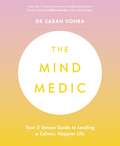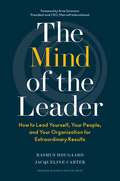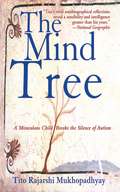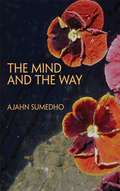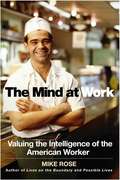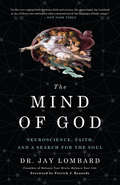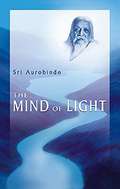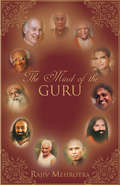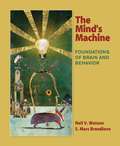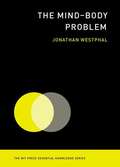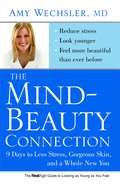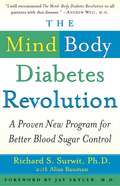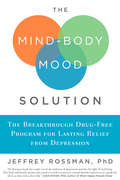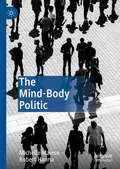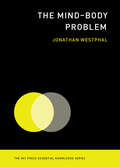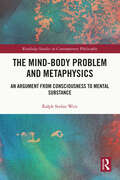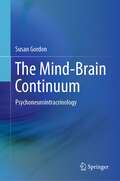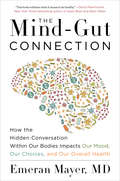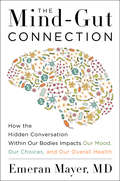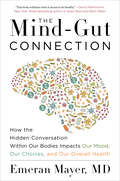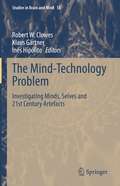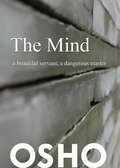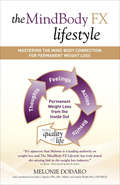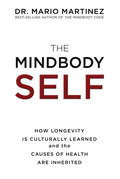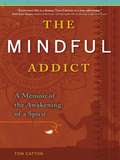- Table View
- List View
The Mind Medic: Your 5 Senses Guide to Leading a Calmer, Happier Life
by Dr Sarah Vohra*For fans of Fearne Cotton's Calm and Matt Haig's Notes of a Nervous Planet*At some point in our lives we will all struggle with our mental health. But how many of us know what to actually do when we're struggling? How do you spot the warning signs and what can you do to stop things from escalating? From leading Consultant Psychiatrist, Dr Sarah Vohra (aka The Mind Medic), comes The 5 Senses Plan - a practical guide to improving your mental wellbeing using your 5 senses to help you along the way. The 5 Senses Plan offers expert advice and easy-to-follow exercises on how to optimise your senses, including:· SIGHT: how to see beyond the negative and use CBT techniques to reframe thought patterns· HEARING: exploring the role of a mentor and creating a space to listen and be listened to· SMELL: how to introduce calming scents into your life and the science behind aromatherapy · TOUCH: putting your worries in a worry box to help validate and contain your thoughts · TASTE: how to eat for your mind and discovering mood-boosting micronutrientsDr Vohra debunks the myths and conflicting advice surrounding mental health, setting out a 10-week plan to equip you with the knowledge and strategies for a happier, calmer mind. With The 5 Senses Plan, feel empowered with the knowledge to take control of your own mental health, the confidence to have honest conversations and the strength to seek support early.
The Mind Of The Leader: How To Lead Yourself, Your People, And Your Organization For Extraordinary Results
by Rasmus Hougaard Jacqueline CarterThe world is facing a global leadership crisis. Seventy-seven percent of leaders think they do a good job of engaging their people, yet 88 percent of employees say their leaders don't engage enough. There is also a high level of suffering in the workplace: 35 percent of employees would forgo a pay raise to see their leaders fired. <p><p> This is an enormous waste of human talent--despite the fact that $46 billion is spent each year on leadership development. <p> Based on extensive research, including assessments of more than 35,000 leaders and interviews with 250 C-level executives, The Mind of the Leader concludes that organizations and leaders aren't meeting employees' basic human needs of finding meaning, purpose, connection, and genuine happiness in their work. <p> But more than a description of the problem, The Mind of the Leader offers a radical, yet practical, solution. To solve the leadership crisis, organizations need to put people at the center of their strategy. They need to develop managers and executives who lead with three core mental qualities: mindfulness, selflessness, and compassion. <p> Using real-world inspirational examples from Marriott, Accenture, McKinsey & Company, LinkedIn, and many more, The Mind of the Leader shows how this new kind of leadership turns conventional leadership thinking upside down. It represents a radical redefinition of what it takes to be an effective leader--and a practical, hard-nosed solution to every organization's engagement and execution problems.
The Mind Tree: A Miraculous Child Breaks the Silence of Autism
by Tito Rajarshi MukhopadhyayWell-received on initial publication, The Mind Tree is truly an enthralling read. Although he is severely autistic and nearly nonverbal, Tito's ability to communicate through his extraordinary writing is astonishing. At the age of three, Tito was diagnosed with severe autism. But his mother, with boundless hope and determination, read to him and taught him to write in English. She also challenged him to write his own stories. The result of their efforts is this remarkable book-written when he was eight to eleven years old-comprised of profound and startling philosophical prose and poetry. During a New York Times interview, Tito scrawled on a yellow pad, "I need to write . . . It has become a part of me."
The Mind and the Way
by Ajahn Sumedho Venerable Balangoda AnandamaitreyaWhat would life be like if each one of us chose compassion over anger, loving-kindness over hatred, awareness over ignorance? The Mind and the Way demonstrates a radically simple approach to life, one in which we are able to awaken to our true loving nature and delight in the mystery and wonder of the world. With warmth and a wonderful sense of humor, Ajahn Sumedho draws on the experiences of ordinary life to convey Buddhist insights that for 2,500 years have continued to remain vital and pertinent to our lives.
The Mind at Work: Valuing the Intelligence of the American Worker
by Mike RoseIn the tradition of Barbara Ehrenreich's "Nickel and Dimed" and Studs Terkel's "Working", "The Mind at Work" is an illuminating reassessment of American labor. Testimonials to physical work have always celebrated the dignity, the economic and moral value, even the nobility of blue-collar labor, but rarely the thought required to get the job done right. The lightning-fast organization and mental calculations of the waitress; the complex spatial mathematics of the carpenter; the aesthetic and intellectual dexterity of the hair stylist, our failure to acknowledge or respect these qualities has undermined a large portion of America's working population. Integrating personal stories of his own working-class family with interviews, vivid snapshots of people on the job, and current research in social science and cognitive psychology, Rose draws a brilliantly original portrait of America at work. As he probes the countless decisions, computations, and subtle judgments made every day by welders and plumbers, waitresses and electricians, Rose redefines the nature of important work and overturns the "hand/brain" dichotomy that blinds us to the real contributions of working people.
The Mind of God: Neuroscience, Faith, and a Search for the Soul
by Patrick J. Kennedy Jay LombardFor fans of Deepak Chopra, Rudy Tanzi, and Andrew Newberg. A renowned behavioral neurologist provides insights to some of the most curious spiritual questions we all face. Is there a God?It’s a question billions of people have asked since the dawn of time. You would think by now we’d have a satisfactory, universal answer. No such luck…Or maybe we do and we just need to look in the right place. For Dr. Jay Lombard that place is the brain, and more importantly the mind, that center of awareness and consciousness that creates reality.In The Mind of God, Dr. Lombard employs case studies from his own behavioral neurology practice to explore the spiritual conundrums that we all ask ourselves: What is the nature of God? Does my life have purpose? What's the meaning of our existence? Are we free? What happens to us when we die?For Lombard, these metaphysical questions are a jumping-off point for exploring the brain in search of the seat of the soul. It is neuroscience, the author contends, and how we and our brains interpret what’s going on around us that can lead us to a deeper and more fulfilling faith. Mixing his personal experiences in the medical field (including compelling cases such as the male patient who really thought he was pregnant and a woman who literally scared herself to death) along with his own visionary insight into spiritual experience, Lombard has much to tell us about the nature and power of belief—and what we can do to focus our beliefs in a positive direction. If you want to find more meaning in your life or are searching for a deeper understanding of why we believe what we believe, then this book can lead to an exciting transformation in the way you see and understand the world around you. With cutting-edge research and provocative case studies, renowned behavioral neurologist provides insights to some of the most curious spiritual questions of mortality.
The Mind of Light
by Sri AurobindoThe book is a guide to the future evolution of consciousness. The text includes an added section on The Teaching of Sri Aurobindo as a general overview, as well as an extensive annotated bibliography and introduction by Dr. Robert McDermott.
The Mind of the Guru: Conversation With Spiritual Masters
by Rajiv MehrotraIn The Mind of the Guru, Rajiv Mehrotra presents dialogues with several contemporary sages and masters who have illumined the minds of millions around the world. Ranged here are gurus as diverse as B. K. S. Iyengar, who brought yoga from the world of the esoteric to our living rooms; Swami Ramdev, who has democratized yoga via television; and Mata Amritanandamayi, whose mere presence invokes an overwhelming awareness of love. There is Deepak Chopra discussing a quantum healing of mind and body, Sogyal Rinpoche encouraging us to look at death so that we might live a better life and Sri Sri Ravi Shankar reaffirming each person’s right and access to happiness. And there is the unique and contrary voice of U. G. Krishnamurti telling us that all talk of transformation is poppycock. There are no grand narratives or final solutions, only guides who can show the way to the light within. Here you learn from voices as diverse as that of Thich Nhat Hanh, Bishop Desmond Tutu, Baba Amte and Stanislav Grof. Underlying the dialogues is their wisdom on how we can make ourselves unhappy – and guidance on how we can turn our livesaround to achieve happiness.
The Mind's Machine: Foundations of Brain and Behavior
by S. Marc Breedlove Neil V. WatsonThe book introduces us to the basics of behavioral neuroscience in a way that focuses on the foundational topics in the field.
The Mind--Body Problem
by Jonathan WestphalPhilosophers from Descartes to Kripke have struggled with the glittering prize of modern and contemporary philosophy: the mind-body problem. The brain is physical. If the mind is physical, we cannot see how. If we cannot see how the mind is physical, we cannot see how it can interact with the body. And if the mind is not physical, it cannot interact with the body. Or so it seems. In this book the philosopher Jonathan Westphal examines the mind-body problem in detail, laying out the reasoning behind the solutions that have been offered in the past and presenting his own proposal. The sharp focus on the mind-body problem, a problem that is not about the self, or consciousness, or the soul, or anything other than the mind and the body, helps clarify both problem and solutions. Westphal outlines the history of the mind-body problem, beginning with Descartes. He describes mind-body dualism, which claims that the mind and the body are two different and separate things, nonphysical and physical, and he also examines physicalist theories of mind; antimaterialism, which proposes limits to physicalism and introduces the idea of qualia; and scientific theories of consciousness. Finally, Westphal examines the largely forgotten neutral monist theories of mind and body, held by Ernst Mach, William James, and Bertrand Russell, which attempt neither to extract mind from matter nor to dissolve matter into mind. Westphal proposes his own version of neutral monism. This version is unique among neutral monist theories in offering an account of mind-body interaction.
The Mind-Beauty Connection
by Amy WechslerIt's not your age that's causing half of those lines and crinkles. It's your life. Now, Amy Wechsler, MD shows you how to de-stress your skin and take years -- years -- off your face. In 9 days. Liking the way you look is vital to your health and happiness. But that's not easy when life runs at warp speed -- you're simultaneously coping with ever-increasing demands: dependent kids, aging parents, or both; shopping; cooking; laundry; money pressures; and more, more, more. Good bet you're superstressed, tightly wound, sleep-deprived -- and it shows. Sure, but your thirties you've accumulated the first signs of normal aging: crow's feet, a bit of saf, some broken capillaries. But stress aging -- how the madness of modern life affects your physical features inside and out -- is today's biggest skin and health challenge. Happily, stress aging is very reversible. And it takes only a few days. While you may never be able to totally turn off all the pressure (if only!), Dr. Wechsler has plenty of combination strategies -- from her own favorite stress buster to her number one wrinkle reverser -- to help you turn back the aging effects of tension and time. She'll also teach you how to slow down and, to some degree, reverse the natural aging process. This is your guide to feeling, looking, and living young. In her book, she shows you how to: Find out your SkinAge with a groundbreaking test that reveals how old (or young!) you really book Personalize a 9-day renewal plan that's right for your face, wallet, and psyche Understand the different cosmetic procedures and products available today Adopt a mind-beauty regimen that will keep your skin -- correction: your whole body -- looking and feeling terrific -- not just for now, but for life. The mind-beauty connection is powerful and can dramatically affect how well -- and how fast -- you age. The rewards for soling it go far beyond a quick fix. They're transforming. You'll not only look better, you'll also sleep better, feel better, and likely lose unwanted weight as you begin to feel healthier, less stress, and more alive. Ready for a whole new you? Open this book and let's start!
The Mind-Body Diabetes Revolution
by Jay Skyler Richard S. Surwit Alisa BaumanThe Mind-Body Diabetes Revolution is the first book to show how stress, depression, and anger affect blood sugar. It's also the first to provide a proven, step-by-step health program to help the millions of people with diabetes manage their disease. Until now, this life-changing program was available only to patients at Duke University Medical Center, but The Mind-Body Diabetes Revolution makes it available to everyone who needs it -- diabetic people and the millions at risk for developing the disease.Over the past forty years, little has changed in the treatment of type 2 diabetes. Diet, exercise, and medication are still the three primary methods used to control blood sugar. Yet diabetes is reaching epidemic proportions not just in the United States, but also in other countries all over the world. Now, after twenty years of research, Dr. Richard S. Surwit -- a leader in the field of the psychology of diabetes -- adds the vital fourth component to treating diabetes: a revolutionary mind-body program that lowers blood sugar levels and dramatically reduces the disease's serious, damaging side effects, which can include painful nerve damage, heart disease, impotence, eye problems, and kidney ailments.The Mind-Body Diabetes Revolution explains how thoughts and beliefs influence a person's emotions and moods and shows how these can translate into chronic anger, cynicism, anxiety, and depression -- all of which increase your blood sugar level. But, with compelling case studies and a powerfully effective step-by-step six-week program, Dr. Surwit demonstrates how you can learn to manage the emotions and stress that lead to elevated hormones and higher blood sugar levels. After he explains the mind-metabolism connection so that you see how it works in your own body, Dr. Surwit provides self-tests and reflective quizzes to test your personality type and decide on the best -- and easiest -- psychological techniques to help you lower your blood sugar level, and keep it low. Then he helps you develop the best long-term mind-body program for your needs and shows how to use the planner to keep track of your progress.An invaluable aid to your overall well-being, The Mind-Body Diabetes Revolution helps you enlist your own mind and body as powerful allies in controlling your diabetes, and enjoy greater general health as a result.
The Mind-Body Mood Solution: The Breakthrough Drug-Free Program for Lasting Relief from Depression
by Jeffrey RossmanDepression is the leading cause of disability in America. The incidence of depression in the United States today is 10 times greater than it was in 1960—and that rate doubles every decade. Changes in the way we live, work, eat, sleep, and interact have made us increasingly vulnerable to this mood disorder. We are living out of sync with nature, our bodies, our spirits, and one another. We are living in an age of depression.For 30 years, Dr. Jeffrey Rossman has been treating depressed people, many of whom do not want to take medication. Instead, they are looking for practical solutions that will help them get better naturally and permanently.In The Mind-Body Mood Solution, Dr. Rossman offers a comprehensive, drug-free depression treatment program that fully integrates psychological tools with lifestyle practices such as nutrition, exercise, sleep, breathing, and meditation. In doing so, you will learn to make healthy, sustainable changes that have been proven to improve mood. In treating the mind and body, Dr. Rossman advocates for a new view of depression as not simply an illness, but a call from within to awaken to the possibility of a vital, fulfilling life.
The Mind-Body Politic
by Robert Hanna Michelle MaieseBuilding on contemporary research in embodied cognition, enactivism, and the extended mind, this book explores how social institutions in contemporary neoliberal nation-states systematically affect our thoughts, feelings, and agency. Human beings are, necessarily, social animals who create and belong to social institutions. But social institutions take on a life of their own, and literally shape the minds of all those who belong to them, for better or worse, usually without their being self-consciously aware of it. Indeed, in contemporary neoliberal societies, it is generally for the worse. In The Mind-Body Politic, Michelle Maiese and Robert Hanna work out a new critique of contemporary social institutions by deploying the special standpoint of the philosophy of mind—in particular, the special standpoint of the philosophy of what they call essentially embodied minds—and make a set of concrete, positive proposals for radically changing both these social institutions and also our essentially embodied lives for the better.
The Mind-Body Problem (The MIT Press Essential Knowledge Series)
by Jonathan WestphalAn introduction to the mind–body problem, covering all the proposed solutions and offering a powerful new one. Philosophers from Descartes to Kripke have struggled with the glittering prize of modern and contemporary philosophy: the mind-body problem. The brain is physical. If the mind is physical, we cannot see how. If we cannot see how the mind is physical, we cannot see how it can interact with the body. And if the mind is not physical, it cannot interact with the body. Or so it seems.In this book the philosopher Jonathan Westphal examines the mind-body problem in detail, laying out the reasoning behind the solutions that have been offered in the past and presenting his own proposal. The sharp focus on the mind-body problem, a problem that is not about the self, or consciousness, or the soul, or anything other than the mind and the body, helps clarify both problem and solutions. Westphal outlines the history of the mind-body problem, beginning with Descartes. He describes mind-body dualism, which claims that the mind and the body are two different and separate things, nonphysical and physical, and he also examines physicalist theories of mind; antimaterialism, which proposes limits to physicalism and introduces the idea of qualia; and scientific theories of consciousness. Finally, Westphal examines the largely forgotten neutral monist theories of mind and body, held by Ernst Mach, William James, and Bertrand Russell, which attempt neither to extract mind from matter nor to dissolve matter into mind. Westphal proposes his own version of neutral monism. This version is unique among neutral monist theories in offering an account of mind-body interaction.
The Mind-Body Problem and Metaphysics: An Argument from Consciousness to Mental Substance (Routledge Studies in Contemporary Philosophy)
by Ralph Stefan WeirThis book evaluates the widespread preference in philosophy of mind for varieties of property dualism over other alternatives to physicalism. It takes the standard motivations for property dualism as a starting point and argues that these lead directly to nonphysical substances resembling the soul of traditional metaphysics. In the first half of the book, the author clarifies what is at issue in the choice between theories that posit nonphysical properties only and those that posit nonphysical substances. The crucial question, he argues, is whether one posits nonphysical things that satisfy an Aristotelian-Cartesian independence definition of substance: nonphysical things that could exist in the absence of anything else. In the second half, the author argues that standard and Russellian monist forms of property dualism are far less plausible than we usually suppose. Most significantly, the presuppositions of one of the leading arguments for property dualism, the conceivability argument, lead by parity of reasoning to the view that conscious subjects are nonphysical substances. He concludes that if you posit nonphysical properties in response to the mind-body problem, then you should be prepared to posit nonphysical substances as well. Mainstream philosophy of mind must take nonphysical substances far more seriously than it has done for the best part of a century. The Mind-Body Problem and Metaphysics will be of interest to scholars and advanced students working in philosophy of mind, metaphysics, and the history of philosophy.
The Mind-Brain Continuum: Psychoneurointracrinology
by Susan GordonThis insightful book proposes a holistic theory of the development of self, drawing on interdisciplinary literature in existential-phenomenology, neurophenomenology, intracrinology, endocrinology, and naturopathic medicine. The psychoneurointracrine hypothesis bridges the gap between the mind and brain, providing a framework to explain the complex system that facilitates development of one’s sense of self and well-being. The book challenges assumptions in present day neuroscience and psychiatry, placing the mind and brain on a continuum of health and growth rather than reducing the study of human consciousness to neurobiological terms and pathological classifications.“In this landmark book, Susan Gordon presents a bold hypothesis, one that underscores the importance of psychoneurointracrine activity and links it to female neurology and the development of one’s sense of self. She brilliantly places this activity, which serves as a mind-body bridge, within the frameworks of neurophenomenology and non-linear dynamics. Her psychoneurointracrine hypothesis is a tour de force, one that is holistic, integrating intracrinology with psychology and neurology. This hypothesis undercuts the current assumption that the mind is an epiphenomenon of the brain, creating a paradigm that impacts science’s understanding of behavior, experience, consciousness, and human agency.”Stanley Krippner, PhD, Affiliated Distinguished Faculty, California Institute of Integral Studies, San Francisco, CA“In her fascinating book, Susan Gordon develops a novel theory about the biological connection between mind, brain, and organism. Drawing on empirical research on the role of the female hormonal system in basal states of self and mood, she shows that the biochemistry of the endocrine system must be viewed as an indispensable foundation for the emergence of embodied self-awareness. The homeostasis and hormonal balance of the organism is integral to the sense of well-being and the development of meaning, but it is also continually modulated and influenced by the subject’s experience of his or her world. She makes a decisive contribution to a theory of embodiment that goes far beyond a computational theory of the brain to focus on the biochemical-organismic processes at the root of the mind.”Thomas Fuchs, MD, PhD, Karl Jaspers Professor of Philosophy and Psychiatry, University of Heidelberg, DE
The Mind-Gut Connection: How the Hidden Conversation Within Our Bodies Impacts Our Mood, Our Choices, and Our Overall Health
by Emeran MayerCutting-edge neuroscience combines with the latest discoveries on the human microbiome to inform this practical guide that proves once and for all the inextricable, biological link between mind and body.We have all experienced the connection between our mind and our gut—the decision we made because it “felt right;” the butterflies in our stomach before a big meeting; the anxious stomach rumbling when we’re stressed out. While the dialogue between the gut and the brain has been recognized by ancient healing traditions, including Aryuvedic and Chinese medicine, Western medicine has failed to appreciate the complexity of how the brain, gut, and more recently, the microbiome—the microorganisms that live inside us—communicate with one another. In The Mind-Gut Connection, Dr. Emeran Mayer, Executive Director of the UCLA Center for Neurobiology of Stress, offers a revolutionary look at this developing science, teaching us how to harness the power of the mind-gut connection to take charge of our health.The Mind-Gut Connection, shows how to keep the communication brain-gut communication clear and balanced to:• Heal the gut by focusing on a plant-based diet• Balance the microbiome by consuming fermented foods and probiotics, fasting, and cutting out sugar and processed foods• Promote weight loss by detoxifying and creating a healthy digestion and maximum nutrient absorption• Boost immunity and prevent the onset of neurological diseases such as Parkinson’s and Alzheimer’s• Generate a happier mindset and reduce fatigue, moodiness, anxiety, and depression• Prevent and heal GI disorders such as leaky gut syndrome; food sensitivities and allergies; and IBS; as well as digestive discomfort such as heartburn and bloating• And much more.Supplemental enhancement PDF accompanies the audiobook.
The Mind-Gut Connection: How the Hidden Conversation Within Our Bodies Impacts Our Mood, Our Choices, and Our Overall Health
by Emeran MayerCombining cutting-edge neuroscience with the latest discoveries on the human microbiome, a practical guide in the tradition of Wheat Belly and Grain Brain that conclusively demonstrates the inextricable, biological link between mind and body.We have all experienced the connection between our mind and our gut—the decision we made because it “felt right”; the butterflies in our stomach before a big meeting; the anxious stomach rumbling when we’re stressed out. While the dialogue between the gut and the brain has been recognized by ancient healing traditions, including Ayurvedic and Chinese medicine, Western medicine has failed to appreciate the complexity of how the brain, gut, and more recently, the microbiome—the microorganisms that live inside us—communicate with one another. In The Mind-Gut Connection, Dr. Emeran Mayer, executive director of the UCLA Center for Neurobiology of Stress, offers a revolutionary look at this developing science, teaching us how to harness the power of the mind-gut connection to take charge of our health.The Mind-Gut Connection shows how to keep the brain-gut communication clear and balanced to:• heal the gut by focusing on a plant-based diet• balance the microbiome by consuming fermented foods and probiotics, fasting, and cutting out sugar and processed foods• promote weight loss by detoxifying and creating healthy digestion and maximum nutrient absorption• boost immunity and prevent the onset of neurological diseases such as Parkinson’s andAlzheimer’s• generate a happier mindset and reduce fatigue, moodiness, anxiety, and depression• prevent and heal GI disorders such as leaky gut syndrome, food sensitivities and allergies, and IBS, as well as digestive discomfort such as heartburn and bloating• and much more.
The Mind-Gut-Immune Connection: Understanding How Food Impacts Our Mind, Our Microbiome, and Our Immunity
by Emeran MayerCutting-edge neuroscience combines with the latest discoveries on the human microbiome to inform this practical guide that proves once and for all the inextricable, biological link between mind and body.We have all experienced the connection between our mind and our gut—the decision we made because it “felt right;” the butterflies in our stomach before a big meeting; the anxious stomach rumbling when we’re stressed out. While the dialogue between the gut and the brain has been recognized by ancient healing traditions, including Aryuvedic and Chinese medicine, Western medicine has failed to appreciate the complexity of how the brain, gut, and more recently, the microbiome—the microorganisms that live inside us—communicate with one another. In The Mind-Gut Connection, Dr. Emeran Mayer, Executive Director of the UCLA Center for Neurobiology of Stress, offers a revolutionary look at this developing science, teaching us how to harness the power of the mind-gut connection to take charge of our health.The Mind-Gut Connection, shows how to keep the communication brain-gut communication clear and balanced to:• Heal the gut by focusing on a plant-based diet• Balance the microbiome by consuming fermented foods and probiotics, fasting, and cutting out sugar and processed foods• Promote weight loss by detoxifying and creating a healthy digestion and maximum nutrient absorption• Boost immunity and prevent the onset of neurological diseases such as Parkinson’s and Alzheimer’s• Generate a happier mindset and reduce fatigue, moodiness, anxiety, and depression• Prevent and heal GI disorders such as leaky gut syndrome; food sensitivities and allergies; and IBS; as well as digestive discomfort such as heartburn and bloating• And much more.Supplemental enhancement PDF accompanies the audiobook.
The Mind-Technology Problem: Investigating Minds, Selves and 21st Century Artefacts (Studies in Brain and Mind #18)
by Inês Hipólito Robert W. Clowes Klaus GärtnerThis edited book deepens the engagement between 21st century philosophy of mind and the emerging technologies which are transforming our environment. Many new technologies appear to have important implications for the human mind, the nature of our cognition, our sense of identity and even perhaps what we think human beings are. They prompt questions such as: Would an uploaded mind be 'me'? Does our reliance on smart phones, or wearable gadgets enhance or diminish the human mind? and: How does our deep reliance upon ambient artificial intelligence change the shape of the human mind? Readers will discover the best philosophical analysis of what current and near future 21st technology means for the metaphysics of mind. Important questions are addressed on matters relating to the extended mind and the distributed self. Expert authors explore the role that the ubiquitous smart phone might have in creating new forms of self-knowledge. They consider machine consciousness, brain enhancement and smart ambient technology, and what they can tell us about phenomenal consciousness. While ideas of artificial general intelligence, cognitive enhancements and the smart environment are widely commented on, serious analysis of their philosophical implications is only getting started. These contributions from top scholars are therefore very timely, and are of particular relevance to students and scholars of the philosophy of mind, philosophy of technology, computer science and psychology.
The Mind: a beautiful servant, a dangerous master
by Osho Osho International FoundationOsho analyses the function of the human mind in connection with meditation. Responding here to a question related to a space of 'no-mind' or mindfulness he says: "meditation covers a very long pilgrimage. When I say "meditation is witnessing", it is the beginning of meditation. And when I say "meditation is no-mind," it is the completion of the pilgrimage. Witnessing is the beginning, and no-mind is the fulfillment. Witnessing is the method to reach the no-mind. Naturally you will feel witnessing is easier. It is close to you. But witnessing is only like seeds, and then is the long waiting period. "
The MindBody FX Lifestyle: Mastering the Mind-Body Connection for Permanent Weight Loss
by Melonie DodaroThe last method you'll ever need to lose weight and keep it off…for good! Losing weight can be a frustrating ordeal, but the secret to getting into great shape isn't a fad diet, a new supplement, or a dreadful workout plan…it's being able to master your mind! With the MindBody FX Lifestyle you will have the body you want quickly and easily, regain your confidence, self-esteem and energy, and reprogram your mind to achieve lasting weight loss.
The MindBody Self: How Longevity Is Culturally Learned And The Causes Of Health Are Inherited
by Mario MartinezIn these turbulent times, just about every solution you can think of has been put forth by someone, somewhere, as a way to calm the waters and live with more happiness and ease. But the fact is you cannot think your way to a better life. Change isn’t something your mind can accomplish alone. It calls for mind and body to work together in a deeper unity than you may ever have imagined.Neuropsychologist Mario Martinez is a pioneer in the science of the mindbody —his term for that essential oneness of cognition and biology —and a passionate advocate for its power to reshape our lives, if we work with it consciously. In The MindBody Self, he builds on the foundation he laid in the critically acclaimed MindBody Code to explore the cultural conditions that coauthor our reality and shape every aspect of our lives, from health and longevity to relationships and self-esteem. Then he offers practical tools we can use to shed outworn patterns and create sustainable change.You’ll read about: • How our cultural beliefs affect the diagnosis, prognosis, and treatment of disease • The difference between growing older (which we all do) and "aging" by our culture’s standards (which we can learn not to do) • What happens when we move "beyond the pale" of our tribe’s expectations • How to navigate adversity using uncertainty as a guide • Biocognitive tools for a healthy lifeThe MindBody Self presents groundbreaking ideas derived from rigorous scholarship —but you don’t need a background in science to use what you find here. Each chapter concludes with exercises and experiential processes that make complex scientific discoveries not only accessible, but applicable. The result is a paradigm shift in which the myths of doom are shattered by the science of hope, survival takes a back seat to meaning, and fear gives way to love.
The Mindful Addict
by Tom CattonThe enlightening and worldly journeys of a once hopeless addict whose life was profoundly changed after a chance meeting with a nomadic spiritual healer.
